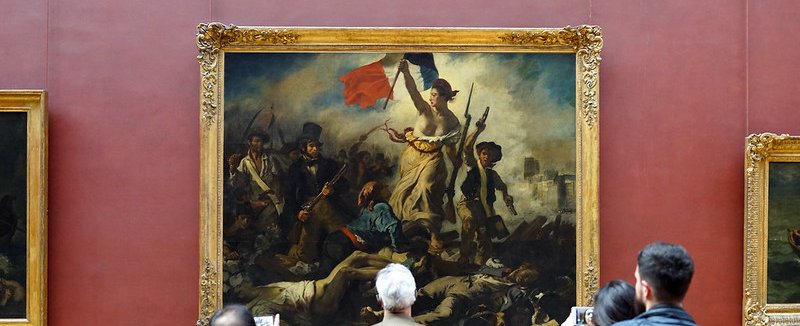
In August, ODI Head of Technology Olivier Thereaux spent a week in Paris to hear directly from the actors of the French data landscape. And ideally, to eat a lot of croissants.
------
The ODI has a long history of bridging the 22 miles – the breadth of the Channel between my native country and the one I now call home. Our co-founder Sir Nigel Shadbolt was the co-chair of the 2016 UK-France Data Innovation Taskforce; and we would follow-up a couple of years later by helping organise a Colloque in Paris as part of a set of projects to enhance data collaboration between the two countries.
The 2018 colloque, however, felt like a whirlwind of ideas and conversations, so for this trip, I was looking forward to one of the positive side-effects of an empty Paris: people who were there would be unrushed, relaxed – if hot – and more open to long conversations about the state of the French data ecosystem than in any other month. A perfect opportunity to learn a little more about the latest initiatives, feel the mood on the ground, and compare with what I would have seen north of La Manche.
An open data hangover, or a healthy shift to the full data spectrum
Talking with old friends and making new ones, I was surprised with the disconnect between what I found to be a healthy community around data and their relative discontent. The notion of ‘open data hangover’ was mentioned, several times: the promising Loi pour une République Numérique had not resulted in as much open data released as some would have hoped.
This situation feels similar to what happened in the UK: there had been a big push for open data, led in the UK government by Cabinet Office minister Francis Maude but then things had slowed down, leading to some fear and resentment. Systemic change, as technology-driven projects often underestimate, takes time. And while policies and political support ebb and flow, legislation provides a more stable base to build on.
Meanwhile, I was told, nobody was quite in the right position to inspire and organise the collective energy around open data. And the state, it seemed, had become less interested in transparency and openness, and more on using data to make its inner workings more efficient.
I could understand the feeling. In France, the work of inspiring and equipping people and organisations to get the best out of (open) data is partly the role of the wonderful Etalab team — but they are also in charge of the state’s open data portal; a perhaps slightly schizophrenic situation. The push for more access to data is also carried out by startups, such as Doctrine, an exciting and disruptive startup in the legal tech scene, and passionate advocates for open data, in their domain and elsewhere.
And yet, I could not help but see all of that in light of the ODI’s own journey from an organisation advocating for open data, to our current identity. We are still aiming to make data work for everyone, but across the whole data spectrum. Good governance, ethics, and innovation, are to be found in the open and shared spaces of the data spectrum, and I can see that the French data landscape, in its own way, was maturing towards that too.
French touch
In an oh-so-Parisian courtyard on a late Friday afternoon, I learned about Le Voice Lab, an initiative by actors in the voice and AI domain to collaborate around access to training data for voice solutions — not dissimilar to Mozilla’s Common Voice initiative, but set up as a kind of data-club-meets-data marketplace. One of my questions was met with a remark that, maybe, I’d spend too long with the anglo-saxons. But I could see parallels with the work happening here in the UK, and indeed elsewhere too, of understanding how data trusts and other types of new institutions can increase access to data while retaining trust.
And while I had to re-learn the very French notion of service regalien –that some services are to be provided by the state and the state only – therefore strongly shaping its relation with the private sector and startups in particular, I was enthused by initiatives such as Startups d’état and Entrepreneurs d’Intérêt Général, and the clever ways they open public services — and the data they hold — to new ideas and new people.
You say éthique, I say ethics
I was surprised to not hear much about the topic of data ethics. While the network of people and organisations working with us at ODI HQ in London are abuzz with it, the term was never mentioned in my Parisian meetings. When I did ask, some posited that maybe I should look to Belgium or the Netherlands — a reminder perhaps that Europe may not have a clear ‘leader’ in the realm of data, but many different approaches, from the laser-focus on public services in Estonia to the focus on civics in places like Barcelona.
In fact, data ethics may not have been a hot keyword, but my samples of The Data Ethics Canvas did go like hot croissants, and I learned of excellent projects around responsible data practices, including how Etalab is working towards public sector algorithmic accountability.
When I set out to work for a week from Paris in the middle of August, I was hoping to meet a number of actors from the data scene there, and indulge in my love of a good croissant. Mid-August isn’t the best time for the latter — every other boulangerie is closed for the month. But I was received with warmth by everyone I met, and with genuine respect for and interest in the work of the ODI. I look forward to continuing weaving these ties across the Channel.